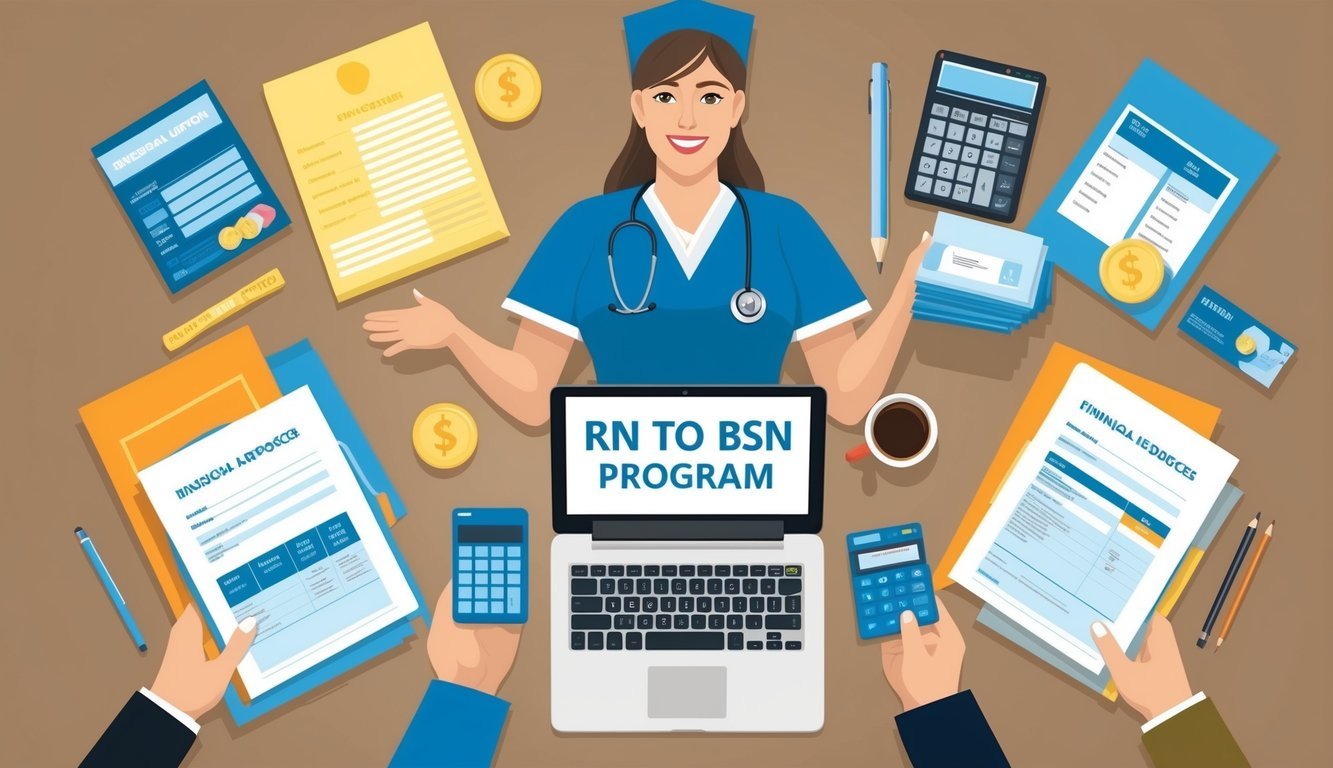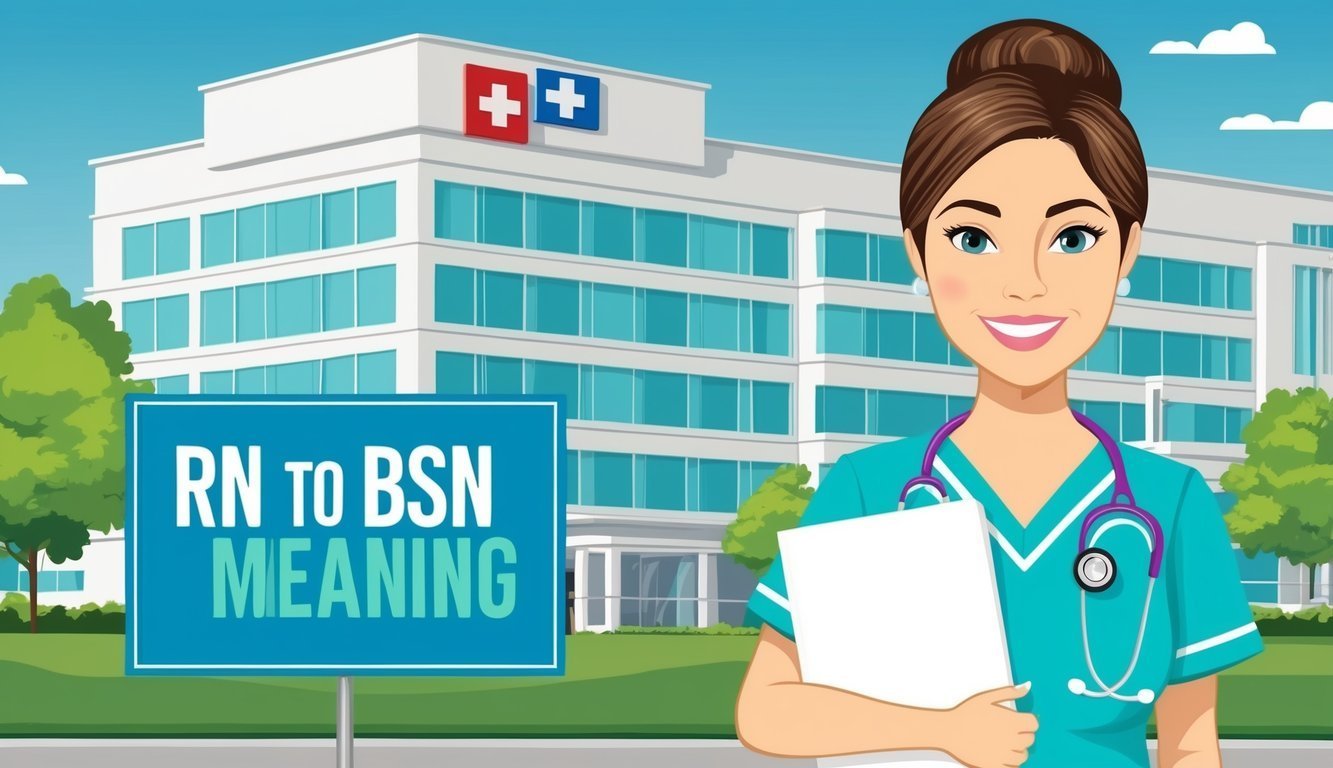Transitioning from a Registered Nurse (RN) to a Bachelor of Science in Nursing (BSN) is a pivotal step in advancing your nursing career. The RN to BSN pathway is designed for current RNs who want to enhance their qualifications, increase their job prospects, and earn a higher salary by obtaining a more comprehensive nursing education.
These programs typically build upon your existing knowledge and skills, focusing on areas like leadership, research, and community health nursing.
As the healthcare landscape evolves, the demand for BSN-prepared nurses continues to rise.
Many employers now prefer or require a BSN for nursing positions, recognizing that a bachelor’s degree equips you with the critical thinking and leadership skills necessary for modern healthcare settings.
Engaging in an RN to BSN program not only opens up new career opportunities but also fosters professional growth and job satisfaction.
If you’re considering advancing your nursing career, understanding the benefits and structure of RN to BSN programs can help you make informed decisions.
Programs vary in format and requirements, so researching your options is essential.
Explore resources like Nurse.org and ANA for more information on how to navigate this important educational step.
Understanding the RN to BSN Pathway
The RN to BSN pathway offers a structured approach for registered nurses seeking to advance their education and career.
This section highlights the essential roles of RNs and the transition from an Associate Degree in Nursing (ADN) to a Bachelor of Science in Nursing (BSN).
The Role of a Registered Nurse
As a registered nurse, you play a crucial part in patient care, education, and health promotion.
Your responsibilities may include assessing patient needs, administering treatments, and collaborating with healthcare teams.
To qualify as an RN, you generally need either an ADN or a nursing diploma.
RNs are licensed to provide comprehensive patient care and possess critical thinking skills essential for effective decision-making.
By obtaining a BSN, you enhance your qualifications and gain deeper knowledge in areas such as nursing research, ethics, and leadership.
This extended training better prepares you for advanced roles, potentially opening opportunities in management or specialized nursing fields.
Advancing from ADN to BSN
Transitioning from an ADN to a BSN program can significantly impact your career trajectory.
ADN programs typically take about two to three years, focusing on practical nursing skills and providing foundational knowledge.
In contrast, a BSN program often builds on this foundation over an additional two years.
It covers advanced topics such as community health, research methodologies, and healthcare policy.
This broader scope of education equips you to take on more complex challenges in the nursing profession.
Many RN to BSN programs are designed to be flexible, often allowing you to complete the degree online while maintaining your job as an RN.
This convenience can make advancing your education more accessible, enabling you to enhance your competencies without disrupting your career.
Key Components of RN to BSN Programs
RN to BSN programs are designed to build on your existing nursing knowledge while preparing you for advanced roles in healthcare.
These programs typically encompass a robust curriculum, clinical experiences, and essential research components that enhance your skills and knowledge.
Core Curriculum and Specializations
The core curriculum of RN to BSN programs consists of nursing coursework that emphasizes critical thinking, leadership, and community health.
You will cover subjects such as nursing research, ethics, and informatics, providing a comprehensive understanding of modern nursing practices.
Many programs also offer specializations, allowing you to focus on areas such as pediatrics, geriatrics, or mental health.
This targeted coursework enables you to tailor your education to your career goals.
To give you an idea, here’s a sample of core courses you might encounter:
| Core Course | Description |
|---|---|
| Nursing Leadership | Focuses on management and leadership roles. |
| Community Health Nursing | Emphasizes public health practices and outreach. |
| Nursing Research | Provides skills for evaluating and conducting research. |
Clinical Experiences and Research
Clinical experiences are a vital component of RN to BSN programs.
These practical placements allow you to apply your theoretical knowledge in real-world settings, often under the guidance of experienced professionals.
Depending on the program, clinical requirements may vary but typically involve a mix of direct patient care and leadership opportunities.
You may also engage in research projects that require you to explore nursing topics relevant to your practice.
This aspect not only enhances your understanding of evidence-based practice but also prepares you for potential roles in advanced nursing practice.
Research may involve:
- Conducting literature reviews
- Analyzing healthcare policies
- Assessing patient outcomes
Through these experiences, you can develop the skills needed for both clinical and academic advancement in your nursing career.
Career Advancement Opportunities
Transitioning from an RN to a BSN opens numerous pathways for career growth.
With additional education, you gain access to leadership roles and specialized fields, enhancing your salary potential and job satisfaction.
Leadership and Management Roles
A BSN prepares you for various leadership and management positions within healthcare.
Roles such as Charge Nurse, Clinical Nurse Leader, and Patient Care Director become attainable.
These positions not only allow you to oversee teams but also involve developing policies and improving patient care processes. Magnet hospitals, known for excellence in nursing and patient outcomes, often seek nurses with a BSN for their leadership roles.
| Role | Average Salary | Key Responsibilities |
|---|---|---|
| Charge Nurse | $78,000 | Supervision of nursing staff |
| Clinical Nurse Leader | $89,000 | Coordinating patient care strategies |
| Patient Care Director | $100,000 | Managing overall patient care services |
Specialized Nursing Fields
With a BSN, you can enter specialized nursing fields like Critical Care, Pediatric Nursing, or Oncology Nursing.
These areas require advanced knowledge and skills, often leading to higher salaries and more fulfilling careers.
Specialized roles tend to offer advancement opportunities, with many organizations encouraging ongoing education and certifications.
This not only enhances your clinical expertise but also positions you for roles in management or education within your specialty.
In specialized fields, you can expect salaries to vary significantly based on location, experience, and demand. Critical Care Nurses, for instance, may earn around $100,000 annually, reflecting the high levels of responsibility and expertise needed in this area.
Licensing and Accreditation Considerations

When pursuing an RN to BSN program, understanding licensing and accreditation is crucial.
You must be aware of the requirements for your nursing license and the standards set by accreditation bodies to ensure the quality of your educational experience.
NCLEX-RN and Continuing Education
To practice as a registered nurse, you need to pass the NCLEX-RN exam after completing your nursing education.
This exam assesses your ability to provide safe and effective care.
Your nursing license must be active and unrestricted to qualify for RN to BSN programs.
In addition, you may be required to complete continuing education as part of maintaining your nursing license.
This ongoing education helps you stay current with the latest practices and advancements in nursing.
States often have specific requirements for continuing education hours, so check your state’s nursing board for more details.
Accreditation Bodies and Standards of Practice
Accreditation is essential for ensuring that your RN to BSN program meets high educational standards.
The American Association of Colleges of Nursing (AACN) accreditation is recognized widely, ensuring that programs align with national standards.
Key accreditation organizations include:
| Organization | Focus |
|---|---|
| CCNE (Commission on Collegiate Nursing Education) | Programs leading to BSN degrees |
| ACEN (Accreditation Commission for Education in Nursing) | All types of nursing education programs |
Programs accredited by these bodies demonstrate a commitment to quality education.
They must meet rigorous standards relating to faculty qualifications, curriculum, and student services.
Ensure that the program you choose holds proper accreditation to enhance your career potential.
Financial Factors and Support Systems

Navigating the financial landscape of an RN to BSN program is crucial for your success.
Understanding tuition costs, financial aid options, and the benefits of online programs can significantly impact your educational journey.
Tuition, Scholarships, and Aid
The cost of RN to BSN programs varies widely.
On average, tuition can range from $10,000 to $30,000, depending on the institution and program type.
Many programs offer financial aid options such as grants and loans.
Scholarships are also available specifically for nursing students.
Some of these include:
- Merit-based scholarships: Awarded based on academic performance.
- Need-based scholarships: Offered to students who demonstrate financial need.
- Institution-specific scholarships: Many colleges provide their own funding opportunities.
In addition, check if your employer offers tuition reimbursement programs.
This can significantly reduce your out-of-pocket expenses while furthering your education.
Online Program Advantages
Choosing an online RN-to-BSN program can provide increased flexibility.
You can study while balancing work and personal commitments.
Many reputable institutions offer online BSN programs that maintain accreditation and high academic standards.
Online programs often have lower associated costs.
You can save on commuting and housing fees.
Moreover, you may have access to a wider range of scholarships specifically for online students.
Consider these factors when selecting your program.
Financial support is vital for achieving your educational goals.
Look for institutions that clearly outline their financial aid options and support systems.
This will help you make an informed decision that aligns with your financial situation and career aspirations.

